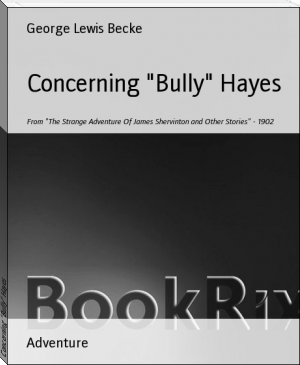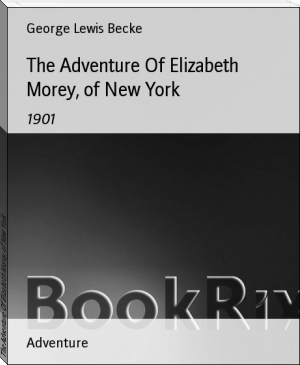Ridan The Devil And Other Stories - George Lewis Becke (free ebooks for android txt) 📗

- Author: George Lewis Becke
Book online «Ridan The Devil And Other Stories - George Lewis Becke (free ebooks for android txt) 📗». Author George Lewis Becke
enlisted as a drummer.
And so for a time Maurice lived in the barracks under the care of Sergeant MacDougall, a crusty old warrior, who proved a hard master and made the boy's life anything but a happy one. And Maurice, though he was proud of the colonel's kind words and of serving with the regiment, fretted greatly at the harsh manner of the old sergeant.
One morning he was reported as missing. Little did those who looked for him all the next day think that the boy was far out at sea, for he had stowed away on board the _Boadicea_; and although Captain Williams was very angry with him when he was discovered and led aft, the lad's genial temper and bright, honest face soon won him over, as, indeed, it did everyone else on board.
For nearly an hour after the boat had landed at the mouth of the little stream the seamen were busily-engaged in filling the water casks. Not a sign of a native could be seen, and then, regardful of the longing looks that the sailors cast at the grove of coco-nuts, the captain, taking with him Maurice and four hands, set out along the beach for the purpose of gathering a few score of the young nuts to give to his men to drink.
One of the four seamen was a Kanaka named 'Tommy Sandwich.' He was a native of Sandwich or Vate Island in the New Hebrides. In a very short time this man had ascended a lofty palm-tree, and was throwing down the coco-nuts to the others, who for some minutes were busily engaged tying them together to carry them to the boat.
'That will do, Tommy,' cried the captain, presently. 'Come down now and help the others to carry.' He did not see that Maurice, boy-like and adventurous, had managed to ascend a less lofty tree some little distance away, out of sight of his shipmates, and at that moment was already ensconced in the leafy crown, gazing with rapture at the lovely scene that lay before him.
It took the men but another ten minutes to tie up the coco-nuts into bunches of ten, and then each of them drank copiously of the sweet milk of half a dozen which Tommy had husked for them.
'Come, lads,' said Captain Williams, 'back to the boat now. By-and-by--'
A dreadful chorus of savage yells interrupted him, and he and the men seized their muskets and sprang to their feet. The sounds seemed to come from where the boat was watering; in a few seconds more four musket shots rang out.
'Run, run for your lives,' cried the captain, drawing his pistol. 'The savages are attacking the boat.' And the seamen, throwing down the coco-nuts, rushed out of the palm grove to rescue their shipmates.
They were only just in time, for the banks of the little stream were covered with naked savages, who had sprung out of the thick undergrowth upon the watering party, and ere the boat could be pushed off two of the poor sailors had been savagely slaughtered. Fortunately for the captain and his party, they were nearer to the boat, when they made their appearance, than were the natives, and, plunging into the water, and holding their muskets over their heads, they reached her in safety, and at once opened fire, whilst the rest of the crew bent to the oars.
But the danger was not yet over, for as soon as the boat was out of reach of the showers of spears sent at her from the shore, a number of canoes appeared round a bend of the mountainous coast. They had evidently been sent to cut off the white men's retreat. And then began the race for life to the ship which had been witnessed by Baringa and his people from the mainland.
Maurice, from his tree, had heard the yells of the savages and the gunshots, and was about to descend and follow the captain and his shipmates, when he heard a rush of bodies through the palm grove, and saw beneath him forty or fifty natives, all armed with clubs and spears. They were a horrible-looking lot, for they were quite naked and the lips of all were stained a deep red from the juice of the betel-nut, and their dull reddish-brown bodies were daubed over with yellow and white stripes. This party had perhaps meant to surprise the captain and his men as they were getting the coco-nuts, for, finding them gone, they at once rushed out of the grove in pursuit. Fortunately for Maurice they were too excited to think of looking about them, else his end would have come very quickly.
For nearly ten minutes the lad remained quiet, listening to the sounds of the fighting, and in fearful doubt as to his best course of action--whether to make a bold dash and try to find his way to the boat, or remain in the tree till a rescue party was sent from the ship. Suddenly the thundering report of one of the ship's guns made him peer seaward through the branches of his retreat; and there, to his delight, he caught a brief view of the boat. Again the report of another gun pealed out, and a wild screaming cry from the natives told him that the shot had done some execution.
'I must get out of this,' he thought, 'and make a bolt along the beach in the other direction, till I get into the hills. I can see better from there, and perhaps make a signal to the ship.' Maurice got quietly down from the tree, and after looking cautiously about him, was about to set off at a run, when he found himself face to face with a young native boy, who, running quickly forward, grasped him by the hands, and began to talk volubly, at the same time trying to drag him towards the beach. The boy, save for a girdle of ti leaves, was naked, and Maurice, anxious and alarmed as he was for his own safety, could not but notice that the young savage seemed terribly excited.
'Let me go, ye black naygur,' said Maurice, freeing his hands and striking him in the chest.
In an instant the native boy fell upon his knees, and held up his hands, palms outward, in a supplicating gesture.
Puzzled at this, but still dreading treachery, Maurice turned away and again sought to make his way to the hills; but again the boy caught his hands, and with gentle force, and eyes filled with tears, tried to push or lead him to the beach. At last, apparently as if in despair of making the white lad understand him by words, he made signs of deadly combat, and ended by pointing over to where the boat had been attacked. Then, touching Maurice on the chest, and then himself, he pointed to the sea, and lying on the ground worked his arms and legs as if swimming.
'Sure, perhaps he's a friend,' thought Maurice, 'an' wants me to swim off to the ship. But perhaps he's a thraitor and only manes to entice me away to be murdered. Anyway, it's not much of a choice I've got at all. So come on, blackamoor, I'm wid ye.'
Although not understanding a word that Maurice said, the native boy smiled when he saw that the white lad was willing to come with him at last. Then, hand-in-hand, they ran quietly along till they reached the beach; and here the native, motioning Maurice to keep out of view, crept on his hands and knees till he reached a rock, and then slowly raised his head above it and peered cautiously ahead.
Whatever it was he saw evidently satisfied him, for he crawled back to Maurice, and again taking his hand broke into a run, but instead of going in the direction of the river, he led the way along the beach in the opposite direction. Feeling confident now that he had found a friend, Maurice's spirits began to rise, and he went along with the boy unhesitatingly.
At last they rounded a sandy point, covered with a dense growth of coco-nut trees and pandanus palms; this point formed the southern horn of a small deep bay, in the centre of which stood an island, warded by a snow-white beach, and on the nearmost shore Maurice saw a canoe drawn up.
The island beach was quite three hundred yards away, but Maurice was a good swimmer, and although he shuddered at the thought of sharks, he plunged in the water after his dark-skinned companion and soon reached the islet, which was but a tiny spot, containing some two or three score of coco-palms, and three untenanted native huts. It was used by the natives as a fishing station, and the canoe, which was a very small one, had evidently been in use that day. Close by were the marks in the sand where a larger one had been carried down. In one of the huts smoke was arising from a native ground-oven, which showed that the fishermen had not long gone; doubtless they would return when the food was cooked, for the native boy pointed out the oven to Maurice with a look of alarm.
The two boys soon launched the canoe, and each seizing a paddle, at once struck out in the direction of the ship. The native lad sat aft, Maurice for'ard, and clumsy as was the latter with the long and narrow canoe paddle, he yet managed to keep his seat and not capsize the frail little craft.
'Hurroo!' cried foolish Maurice, turning to his companion, 'we're all right now, I'm thinkin'. There's the ship!'
There she was sure enough, and there also were four canoes, paddling along close in-shore, returning from their chase of the captain's boat. They heard Maurice's loud shout of triumph, at once altered their course, and sped swiftly towards the two boys.
* * * * *
Scarcely had Captain Williams and his exhausted crew gained the ship when the mate reported that a fleet of canoes was coming across from the mainland of New Britain, and orders were at once given to load the ship's eight guns with grape and canister. (In those days of Chinese and Malay pirates and dangerous natives of the South Seas, all merchants ships, particularly those engaged in the sandal-wood trade, were well armed, and almost man-of-war discipline observed.)
'We'll give them something to remember us by, Hodgson,' said Captain Williams, grimly. 'That poor lad! To think I never noticed he was not in the boat till too late! I expect he's murdered by now; but I shall take a bloody vengeance for the poor boy's death. Serve out some grog to the hands, steward; and some of you fellows stand by with some shot to dump into the canoes if we should miss them with the guns and they get alongside.'
But just as he spoke the mate called out, 'The canoes have stopped paddling, sir, all except one, which is coming right on.'
'All right, I see it. Let them come and have a look at us. As soon as it gets close enough, I'll sink it.'
For some minutes the canoe, which contained seven men, continued to advance with great swiftness; then she ceased paddling, and the steersman stood up and called out something to the ship, just as she was well covered by two of the guns on the port side.
And so for a time Maurice lived in the barracks under the care of Sergeant MacDougall, a crusty old warrior, who proved a hard master and made the boy's life anything but a happy one. And Maurice, though he was proud of the colonel's kind words and of serving with the regiment, fretted greatly at the harsh manner of the old sergeant.
One morning he was reported as missing. Little did those who looked for him all the next day think that the boy was far out at sea, for he had stowed away on board the _Boadicea_; and although Captain Williams was very angry with him when he was discovered and led aft, the lad's genial temper and bright, honest face soon won him over, as, indeed, it did everyone else on board.
For nearly an hour after the boat had landed at the mouth of the little stream the seamen were busily-engaged in filling the water casks. Not a sign of a native could be seen, and then, regardful of the longing looks that the sailors cast at the grove of coco-nuts, the captain, taking with him Maurice and four hands, set out along the beach for the purpose of gathering a few score of the young nuts to give to his men to drink.
One of the four seamen was a Kanaka named 'Tommy Sandwich.' He was a native of Sandwich or Vate Island in the New Hebrides. In a very short time this man had ascended a lofty palm-tree, and was throwing down the coco-nuts to the others, who for some minutes were busily engaged tying them together to carry them to the boat.
'That will do, Tommy,' cried the captain, presently. 'Come down now and help the others to carry.' He did not see that Maurice, boy-like and adventurous, had managed to ascend a less lofty tree some little distance away, out of sight of his shipmates, and at that moment was already ensconced in the leafy crown, gazing with rapture at the lovely scene that lay before him.
It took the men but another ten minutes to tie up the coco-nuts into bunches of ten, and then each of them drank copiously of the sweet milk of half a dozen which Tommy had husked for them.
'Come, lads,' said Captain Williams, 'back to the boat now. By-and-by--'
A dreadful chorus of savage yells interrupted him, and he and the men seized their muskets and sprang to their feet. The sounds seemed to come from where the boat was watering; in a few seconds more four musket shots rang out.
'Run, run for your lives,' cried the captain, drawing his pistol. 'The savages are attacking the boat.' And the seamen, throwing down the coco-nuts, rushed out of the palm grove to rescue their shipmates.
They were only just in time, for the banks of the little stream were covered with naked savages, who had sprung out of the thick undergrowth upon the watering party, and ere the boat could be pushed off two of the poor sailors had been savagely slaughtered. Fortunately for the captain and his party, they were nearer to the boat, when they made their appearance, than were the natives, and, plunging into the water, and holding their muskets over their heads, they reached her in safety, and at once opened fire, whilst the rest of the crew bent to the oars.
But the danger was not yet over, for as soon as the boat was out of reach of the showers of spears sent at her from the shore, a number of canoes appeared round a bend of the mountainous coast. They had evidently been sent to cut off the white men's retreat. And then began the race for life to the ship which had been witnessed by Baringa and his people from the mainland.
Maurice, from his tree, had heard the yells of the savages and the gunshots, and was about to descend and follow the captain and his shipmates, when he heard a rush of bodies through the palm grove, and saw beneath him forty or fifty natives, all armed with clubs and spears. They were a horrible-looking lot, for they were quite naked and the lips of all were stained a deep red from the juice of the betel-nut, and their dull reddish-brown bodies were daubed over with yellow and white stripes. This party had perhaps meant to surprise the captain and his men as they were getting the coco-nuts, for, finding them gone, they at once rushed out of the grove in pursuit. Fortunately for Maurice they were too excited to think of looking about them, else his end would have come very quickly.
For nearly ten minutes the lad remained quiet, listening to the sounds of the fighting, and in fearful doubt as to his best course of action--whether to make a bold dash and try to find his way to the boat, or remain in the tree till a rescue party was sent from the ship. Suddenly the thundering report of one of the ship's guns made him peer seaward through the branches of his retreat; and there, to his delight, he caught a brief view of the boat. Again the report of another gun pealed out, and a wild screaming cry from the natives told him that the shot had done some execution.
'I must get out of this,' he thought, 'and make a bolt along the beach in the other direction, till I get into the hills. I can see better from there, and perhaps make a signal to the ship.' Maurice got quietly down from the tree, and after looking cautiously about him, was about to set off at a run, when he found himself face to face with a young native boy, who, running quickly forward, grasped him by the hands, and began to talk volubly, at the same time trying to drag him towards the beach. The boy, save for a girdle of ti leaves, was naked, and Maurice, anxious and alarmed as he was for his own safety, could not but notice that the young savage seemed terribly excited.
'Let me go, ye black naygur,' said Maurice, freeing his hands and striking him in the chest.
In an instant the native boy fell upon his knees, and held up his hands, palms outward, in a supplicating gesture.
Puzzled at this, but still dreading treachery, Maurice turned away and again sought to make his way to the hills; but again the boy caught his hands, and with gentle force, and eyes filled with tears, tried to push or lead him to the beach. At last, apparently as if in despair of making the white lad understand him by words, he made signs of deadly combat, and ended by pointing over to where the boat had been attacked. Then, touching Maurice on the chest, and then himself, he pointed to the sea, and lying on the ground worked his arms and legs as if swimming.
'Sure, perhaps he's a friend,' thought Maurice, 'an' wants me to swim off to the ship. But perhaps he's a thraitor and only manes to entice me away to be murdered. Anyway, it's not much of a choice I've got at all. So come on, blackamoor, I'm wid ye.'
Although not understanding a word that Maurice said, the native boy smiled when he saw that the white lad was willing to come with him at last. Then, hand-in-hand, they ran quietly along till they reached the beach; and here the native, motioning Maurice to keep out of view, crept on his hands and knees till he reached a rock, and then slowly raised his head above it and peered cautiously ahead.
Whatever it was he saw evidently satisfied him, for he crawled back to Maurice, and again taking his hand broke into a run, but instead of going in the direction of the river, he led the way along the beach in the opposite direction. Feeling confident now that he had found a friend, Maurice's spirits began to rise, and he went along with the boy unhesitatingly.
At last they rounded a sandy point, covered with a dense growth of coco-nut trees and pandanus palms; this point formed the southern horn of a small deep bay, in the centre of which stood an island, warded by a snow-white beach, and on the nearmost shore Maurice saw a canoe drawn up.
The island beach was quite three hundred yards away, but Maurice was a good swimmer, and although he shuddered at the thought of sharks, he plunged in the water after his dark-skinned companion and soon reached the islet, which was but a tiny spot, containing some two or three score of coco-palms, and three untenanted native huts. It was used by the natives as a fishing station, and the canoe, which was a very small one, had evidently been in use that day. Close by were the marks in the sand where a larger one had been carried down. In one of the huts smoke was arising from a native ground-oven, which showed that the fishermen had not long gone; doubtless they would return when the food was cooked, for the native boy pointed out the oven to Maurice with a look of alarm.
The two boys soon launched the canoe, and each seizing a paddle, at once struck out in the direction of the ship. The native lad sat aft, Maurice for'ard, and clumsy as was the latter with the long and narrow canoe paddle, he yet managed to keep his seat and not capsize the frail little craft.
'Hurroo!' cried foolish Maurice, turning to his companion, 'we're all right now, I'm thinkin'. There's the ship!'
There she was sure enough, and there also were four canoes, paddling along close in-shore, returning from their chase of the captain's boat. They heard Maurice's loud shout of triumph, at once altered their course, and sped swiftly towards the two boys.
* * * * *
Scarcely had Captain Williams and his exhausted crew gained the ship when the mate reported that a fleet of canoes was coming across from the mainland of New Britain, and orders were at once given to load the ship's eight guns with grape and canister. (In those days of Chinese and Malay pirates and dangerous natives of the South Seas, all merchants ships, particularly those engaged in the sandal-wood trade, were well armed, and almost man-of-war discipline observed.)
'We'll give them something to remember us by, Hodgson,' said Captain Williams, grimly. 'That poor lad! To think I never noticed he was not in the boat till too late! I expect he's murdered by now; but I shall take a bloody vengeance for the poor boy's death. Serve out some grog to the hands, steward; and some of you fellows stand by with some shot to dump into the canoes if we should miss them with the guns and they get alongside.'
But just as he spoke the mate called out, 'The canoes have stopped paddling, sir, all except one, which is coming right on.'
'All right, I see it. Let them come and have a look at us. As soon as it gets close enough, I'll sink it.'
For some minutes the canoe, which contained seven men, continued to advance with great swiftness; then she ceased paddling, and the steersman stood up and called out something to the ship, just as she was well covered by two of the guns on the port side.
Free e-book «Ridan The Devil And Other Stories - George Lewis Becke (free ebooks for android txt) 📗» - read online now
Similar e-books:





Comments (0)